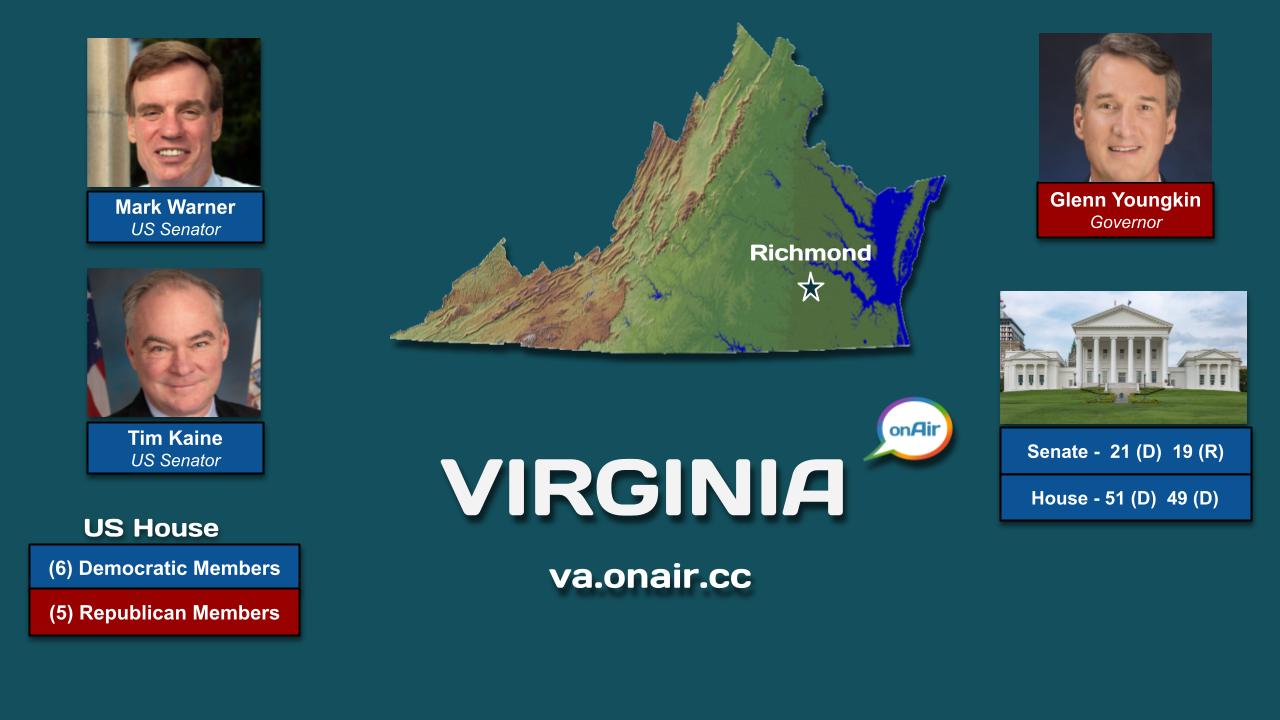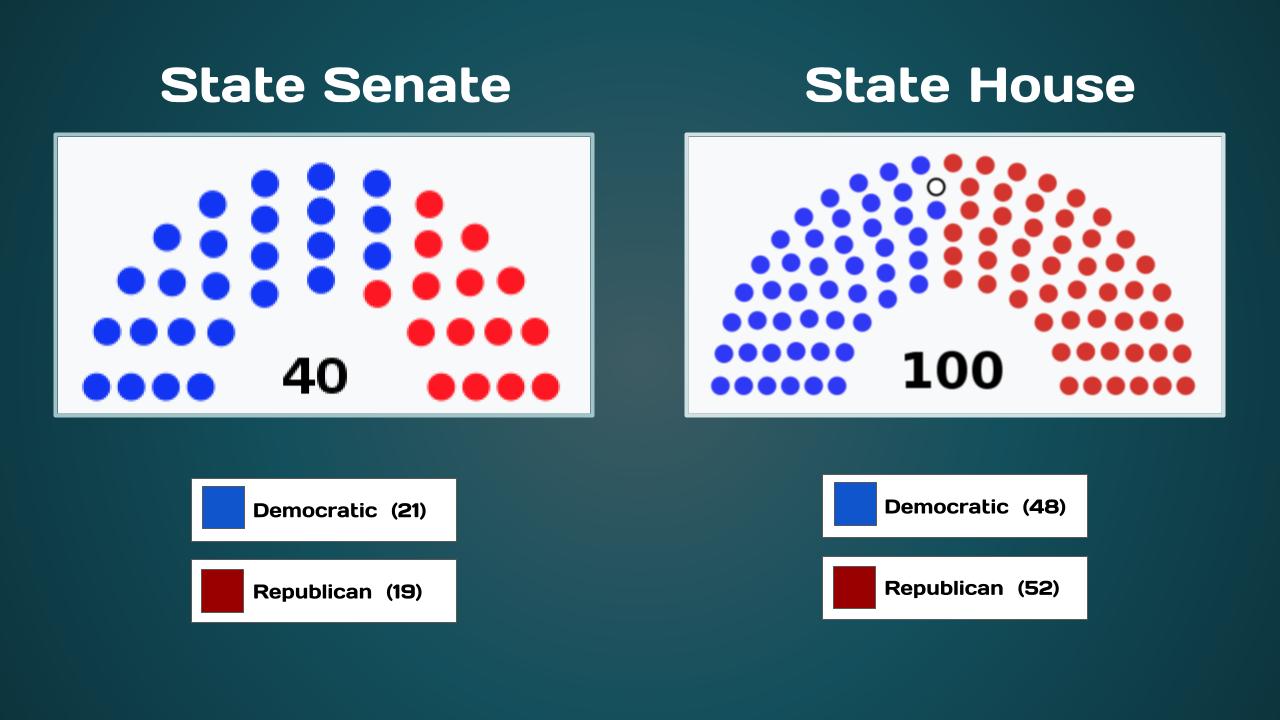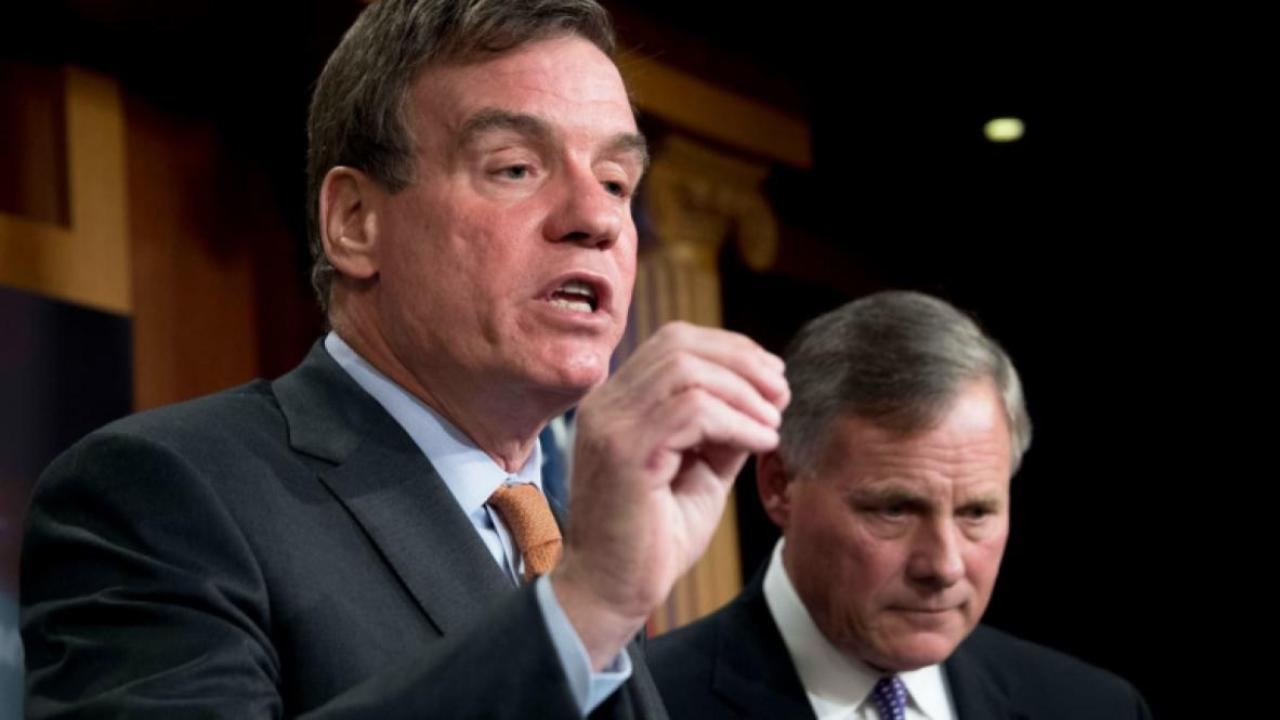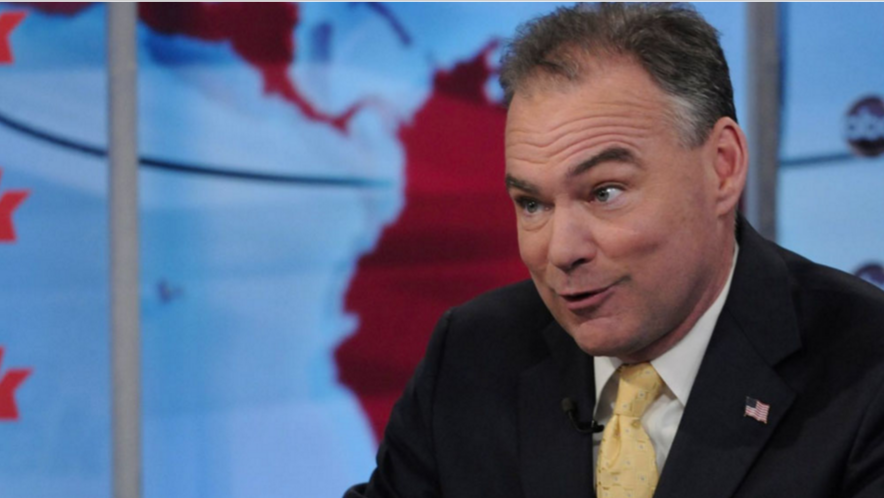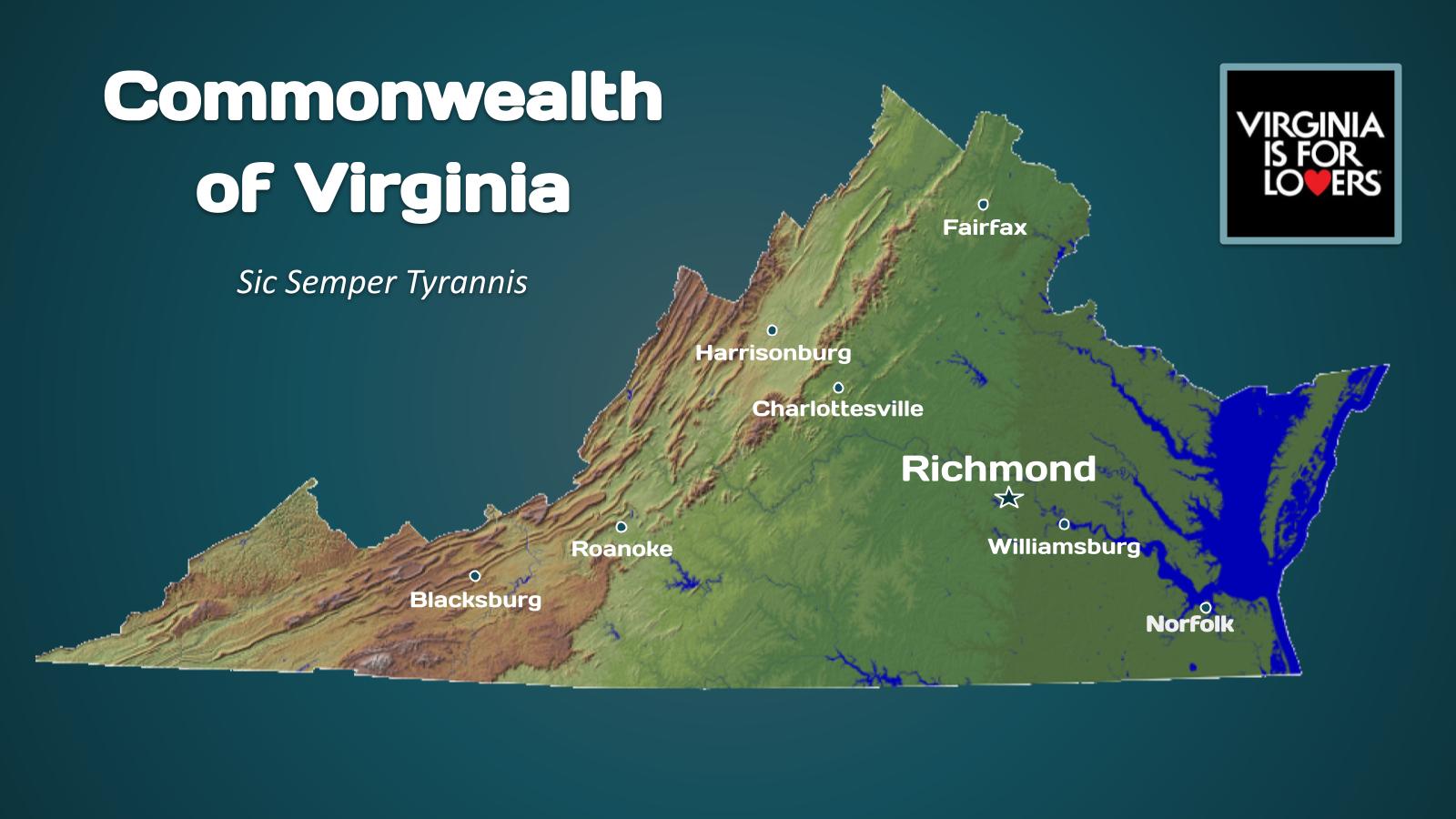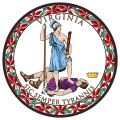Summary
Virginia is located in the Southern region of the USA with Richmond as its capital.
Glenn Youngkin (R) is Governor, Justin Fairfax is Lieutenant Governor, and Mark Herring is Attorney General.
The Virginia General Assembly has 40 Senate members and 100 House of Delegate members.
Governor Glenn Youngkin – 15/01/2024 (45:22)
OnAir Post: Virginia onAir Hub
News
Governor Glenn Youngkin, January 15, 2024 – 6:00 pm (ET)
The Virginia General Assembly’s power over governors is a function of history, strong leadership and most importantly, the Virginia Constitution.
Virginia’s legislature and governor are embroiled in a “two scorpions in a bottle” fight over the new biennial budget, which must be passed by June 30, 2024, to fund the government. On Wednesday, both sides return to Richmond for the “reconvened” or “veto” session.
Budget battles in the commonwealth are not unusual, but this one is unique, both in the number of changes Republican Gov. Glenn Youngkin proposed to the bipartisan spending plan and the rhetoric that has accompanied the process. Youngkin called the bill a “backward budget” and traveled the state on this theme. Legislators fired back, did their own tour and likened Youngkin’s actions to “ what spoiled brats do when they don’t get what they want.”
The governor has vetoed a record number of bills, including measures to protect reproductive rights and enhance gun safety. Since overriding a veto requires a two-thirds vote, expect the governor to win most of these contests.
The fight over the budget bill will be different. Youngkin was initially expected to use the power of the “line-item veto,” by striking specific provisions in the budget and then challenging the legislature to produce a two-thirds vote to override them. His targets were thought to be a tax on digital services he originally proposed and language that requires the commonwealth to rejoin the Regional Greenhouse Gas Initiative (RGGI). But he abandoned this approach when legislators shrewdly drafted these provisions to make a line-item veto legally problematic.
Youngkin instead proposed a record number of 233 separate amendments to the budget bill. Expect few of substance to pass. Each requires a simple majority vote to be included in the budget, and Democrats are still fuming over Youngkin’s rhetoric and vetoes over the last month. Youngkin will then face a difficult choice: He can sign the budget “as presented,” or veto the entire plan, demand a special session and a new budget.
The July 1 deadline for a new budget will then loom large. Fearing a government shutdown, agencies and local governments would scramble to construct contingency plans. Such uncertainty might even prompt a revisiting of Virginia’s celebrated Triple A bond rating, a fixture for more than 50 years. A lot is at stake. Ultimately, the legislature will get most of what it wants, even if it takes a special session to do so.
The legislature is the most powerful branch of government
Youngkin is now learning what his predecessors discovered a long time ago — that the legislature is the strongest branch of government, and the commonwealth’s legislature is perhaps the strongest of all the states.
The Virginia General Assembly’s power over governors is a function of history, strong leadership and most importantly, the Virginia Constitution. Leery of executive power that evidenced itself in dictatorial colonial governors, our founders wrote the state constitutions to favor governance that is closest to the people — the legislature.
This legislative advantage is found in the Virginia Constitution. Virginia is the only state where the chief executive cannot serve consecutive terms, making it difficult for governors to extract concessions from legislators who will serve much longer. In their first year, they are learning the system. By their third year, they are viewed as “lame ducks.”
This dynamic is now playing out in the budget bill. When Virginia governors take office, they are dealing with a two-year budget prepared by the previous chief executive. In most states, newly elected governors submit a budget at the beginning of their term. Not so in Virginia! Newly sworn governors can propose budget amendments, but they are painting on a canvas that has been provided by their predecessor. The only budget plan that is uniquely theirs is created at the end of their second year in office. In their final year, they prepare another two-year budget, but they leave office before the legislature debates it in a new session with a new governor. This gives the legislature an edge in budget deliberations, and further fuels the adage frequently heard in Richmond that “governors come and go; the legislature is forever.”
The commonwealth is now considering the only budget that is Youngkin’s alone. His best chance to leave a legacy is this budget; but his relationship with the legislature is putting this at severe risk.
Virginia’s legislature is uniquely powerful
The power of the Virginia legislature extends beyond appropriations. The body has greater appointment powers than most state legislatures and can derail key nominees that the governor desires. Virginia’s State Corporation Commission (SCC) is a good example. Almost its own branch of government, its decisions affect everything from utility rates to insurance regulation. SCC judges are solely appointed by the legislature. In other states, not only do similar bodies have less power, but the regulators are either elected by citizens or appointed by governors.
In addition, our legislature appoints the entire judiciary. Judges in most states — including state supreme court members — are either appointed by the governor or elected by the citizenry.
This is not the case in Virginia. The commonwealth and South Carolina are the only states where the legislature has total control of these selections. A Virginia governor cannot dispense political perks through judicial appointments.
The system appears almost quaint by comparison to the rough and tumble statewide political campaigns for state supreme court positions recently witnessed in Wisconsin and Pennsylvania. As more fundamental rights are litigated in the state courts, greater attention will be paid to the legislature’s choice of judges.
This week, Richmond is focused on the budget, and my bet is that the legislature eventually will get most of what it wants. And it will then continue to exercise powers that its colleagues in other states cannot, and that arguably makes it the most powerful legislature in the country.
Administration says governor has removed all tax increases, dropped the tax cuts he suggested in his original budget proposal.
Gov. Glenn Youngkin is attempting a major overhaul of Virginia’s pending two-year budget instead of vetoing the full spending plan the Democratic-controlled General Assembly sent to him last month.
The Youngkin administration announced a package of 233 budget amendments Monday, saying the governor has removed all tax increases and dropped the tax cuts he suggested in his original budget proposal late last year.
At a data-heavy news conference that also included presentations from several cabinet officials, Youngkin pitched his new plan as an effort to accommodate Democratic spending priorities without raising taxes.
“That is what finding common ground is all about,” Youngkin said, striking a newly conciliatory tone weeks after he blasted Democratic lawmakers over a spending plan the governor dubbed “the backward budget.”
The governor’s new proposal also includes 3% raises for teachers and state employees in both budget years, reflecting the policy Democratic leaders laid out in the budget they approved in March.
The full details of Youngkin’s proposal weren’t immediately clear Monday because the actual text of what the General Assembly will be asked to vote on wasn’t made available.
After listening to Youngkin’s remarks Monday, Senate Majority Leader Scott Surovell, D-Fairfax, said the presentations left his side with “a lot of questions.”
“We have serious questions about whether or not this budget can be structurally balanced,” Surovell said. Youngkin holding a news conference to stress his desire to work together, Surovell added, was “a distraction from the record number of vetoes this governor has issued.”
The Youngkin administration said its suggested budget changes translate to a general fund of roughly $64 billion, nearly $1 billion higher than what the governor laid out in his December proposal and approximately $1.5 billion less than what the General Assembly approved. Even without the proposed expansion of the state sales tax to cover digital purchases like music downloads, streaming services and software, Youngkin said his plan allows Virginia to allocate more funding for “collective priorities” like K-12 schools, higher education, public safety and mental health.
The administration said it was able to come up with a balanced plan largely by shuffling how and when some projects are funded and reducing the amount of money allocated to K-12 and higher education in comparison to the General Assembly’s budget.
“It wasn’t that we eliminated, we just grew things slightly slower in a few areas,” Youngkin said.
Youngkin also suggested eliminating spending tied to legislative proposals he’s vetoed, such as a $15 minimum wage and retail marijuana marketplace.
inia Governor Glenn Youngkin is vetoing bills at a record pace. According to his office, so far the governor has rejected 87 bills passed by the General Assembly
Election Day is one week away in Virginia, where all 140 General Assembly seats are on the ballot in a high-stakes year that will determine whether Republicans seize full control of state government, Democrats resurge to hold onto the Senate and take back the House or divided power continues for another two years.
Virginia’s off-year legislative races have long attracted national attention because poll watchers view them as a bellwether of how the electorate may lean in congressional and presidential contests. This year has an added layer of interest: Republican Gov. Glenn Youngkin has long flirted with the idea of a presidential run, and the outcome of the election will make it clear how viable his prospects are.
With races tight in roughly a dozen disputed districts, campaigning has turned unusually nasty in a state where politicians tend to pride themselves on their gentility. The latest campaign finance reports filed by candidates ahead of Nov. 7 show the parade of attack ads is being fueled by record amounts of cash — a situation made possible by Virginia’s lax laws, which put few limits on election fundraising or spending.
Here’s four takeaways from the Oct. 30 reports, as published by the Virginia Public Access Project.
Democrats outraised Republicans in the final election stretch, especially in the House, but both parties are throwing around enormous amounts of cash
The amounts of money that have flowed into this year’s elections are huge
Two of the biggest donors are Youngkin’s PAC and Clean Virginia
Richmond’s casino referendum is also drawing big money
Dem donors ignored state legislature races for a long time. Dobbs brought new attention.
Democratic donors are going big on stopping Gov. Glenn Youngkin from taking control of the Virginia legislature.
The States Project is investing more than $4.5 million in next month’s Virginia legislative races, building on its successful investment to flip several statehouses in 2022.
Democrats control the Virginia Senate by a 22-18 majority, and Republicans hold the House by a similarly slim margin. Winning a majority in both chambers could set the stage for a Democratic trifecta in 2025, with big-name Democrats already looking at running for governor. Democrats are worried, though, that it’s equally possible that Youngkin could win a trifecta of his own in November.
“Our side needs to stop treating state legislatures like the minor leagues and start investing in them like the vital races that they are,” said Adam Pritzker, a Democratic donor who co-founded The States Project with Daniel Squadron, a former Democratic state senator for New York.
The issue played a central role in blunting the widely anticipated red wave in last November’s midterm elections.
A crucial new phase in the political struggle over abortion rights is unfolding in suburban neighborhoods across Virginia.
An array of closely divided suburban and exurban districts around the state will decide which party controls the Virginia state legislature after next month’s election, and whether Republicans here succeed in an ambitious attempt to reframe the politics of abortion rights that could reverberate across the nation.
After the Supreme Court overturned the nationwide right to abortion in 2022, the issue played a central role in blunting the widely anticipated Republican red wave in last November’s midterm elections. Republican governors and legislators who passed abortion restrictions in GOP-leaning states such as Florida, Texas, Ohio, and Iowa did not face any meaningful backlash from voters, as I’ve written. But plans to retrench abortion rights did prove a huge hurdle last year for Republican candidates who lost gubernatorial and Senate races in Democratic-leaning and swing states such as Colorado, Washington, Michigan, Pennsylvania, Wisconsin, and Arizona.
How much do Virginia’s elections matter in an off year? Measured by the turnout in past elections, you’d think the answer is “not much.” The percentage of registered voters who show up at the polls in Virginia typically drops well below 50% when no federal or statewide candidates are on the ballot.
But measured by how much the outcome of this year’s election could affect the lives of regular people, the battle for control of the Virginia Senate and House of Delegates matters enormously. With a Republican in the governor’s mansion, a Democratic edge in either or both chambers would continue the status quo of divided government and (mostly) consensus-based lawmaking. A Republican takeover of both chambers, on the other hand, would lead to a wave of new legislation imposing the conservative social agenda on abortion, gay rights, transgender issues, education and welfare.
It would also put an end to Virginia’s leadership on climate and clean energy and lead to costly initiatives protecting fossil fuels, at the expense of consumers and the environment.
Some of the divisions between the two parties are well-known, and the consequences of one party edging out the other are clear. For some issues, however, the party positions are not as obvious, and it takes a look under the hood to understand where elections matter.
Both parties rallying supporters in 45-day runup to General Assembly elections
Starting today, voters across Virginia can begin casting ballots in pivotal General Assembly elections that will decide which party controls the closely divided state legislature.
The start of the 45-day early voting window — during which Virginians can cast ballots in person at their local election office or send an absentee ballot through the mail — is shifting campaign season into higher gear as both parties stage rallies and other events to energize supporters.
The 2023 legislative races are the first being held in new General Assembly districts drawn in 2021 to account for a decade’s worth of population shifts. The redrawn maps and a wave of retirements by longtime legislators means many voters will be seeing new names on the ballot this year in an election cycle that will dramatically reshape Virginia’s legislature no matter which party wins majority control.
Redistricting has put a major spotlight on Senate District 24, which runs from Williamsburg to Poquoson in Virginia’s Tidewater area and reaches south to a portion of Newport News.
As national money floods into the race, both candidates are acknowledging the importance to their party of the seat, but remain determined to run locally focused campaigns.
Sen. Monty Mason, a Democrat, is the incumbent for about 65% of voters. He’s hoping a track record of bipartisan work, including advocating for tax cuts and pushing pro-business measures, will win over swing voters.
Glen Allen, Virginia
The new epicenter of America’s fight over abortion rights is Henrico County, Virginia, where candidates in bellwether state elections this fall are staking out positions that could test how both parties will try to appeal to moderate voters in 2024.
“They don’t want abortion illegal,” GOP state Sen. Siobhan Dunnavant said of Virginia voters last weekend, sipping coffee as a heavy downpour ruined her plans for knocking on doors in this Richmond suburb.
“They want a woman to have a reasonable amount of time to figure out what she needs to do,” she added, before explaining why she supports restricting access to abortion in the third trimester.
That’s not typically how Republican politicians broach the topic. But Dunnavant, an OB-GYN, is airing a 60-second TV ad in which she speaks directly to the camera about her abortion position – namely that it should be legal up to 15 weeks, with some exceptions.
Gov. Glenn Youngkin signed long-delayed amendments to Virginia’s two-year budget on the steps of the state capitol Thursday, concluding a six-month process that has left many local and state agency initiatives in limbo.
“You waited a long time for this day — too long, candidly,” Youngkin said. “But we came together and got it done.”
Thanks to billions in surplus funds, the budget amendments negotiated by the Republican-controlled House and Democratic-controlled Senate offered both parties wins: almost $1 billion in tax reductions for Republicans, largely produced by one-time tax rebates, and major new investments in state programs for Democrats, with a reliance on one-time spending.
“When we put politics down and pick common sense up, look at what we can accomplish together,” said Youngkin Thursday in a speech that both disavowed politics and pointedly criticized Democratic policies and prior administrations — a combination that has become the governor’s signature.
“Right now we’re in the middle of change: change to the way Virginia operates, change to a culture of winning, and change to governing in a way that reflects real results. This represents the reawakening of that spirit of Virginia,” Youngkin said, using a phrase that he has adopted for his Spirit of Virginia PAC.
While Youngkin’s desire to institute long-term tax cuts has mostly been stymied by Democrats during his first 20 months in office, the governor on Thursday touted the state’s “historic” $5 billion in tax reductions over the past two budgets, an amount he said has produced $2,200 in tax relief to a typical Virginia family.
Much of that has or will come in the form of tax rebates, but the past two spending plans have also included major short-term changes to the standard deduction, which has nearly doubled from $4,500 to $8,500 for individuals and $9,000 to $17,000 for joint filers. The increases are scheduled to end in 2026.
Other investments highlighted by the governor Thursday included $200 million to help prepare sites for large-scale economic development projects, $653 million in new education spending, $170 million in behavioral health investments to further Youngkin’s “Right Help, Right Now” plan and $671 million in natural resources spending.
Sen. George Barker, D-Fairfax, one of the Democrats’ chief budget negotiators, said after the signing that many of the new investments were proposals from Senate Democrats, with some — like the extra 2% salary bump for teachers — supported by both parties in the legislature.
Youngkin was particularly supportive of mental health spending, said Barker, who recounted an episode where Senate negotiators told the governor they intended to push for major investments in the area. Youngkin last December had announced his own plan for $230 million to overhaul Virginia’s struggling behavioral health system.
“He said, to his credit, ‘I’m not going to object to anything you put in on mental health,’” Barker said.
Despite both Democrats and Republicans backing major behavioral health spending, the budget signed Thursday includes only $18 million for pay raises for staff at community services boards, the local agencies that provide community-based behavioral health and developmental disability services. Earlier proposals by the House and Senate would have put $37 million or $50 million, respectively, toward CSB staff raises.
“We did what we could,” Barker said. “We had to be able to fund a lot of different things.”
A December 2021 report by Virginia’s legislative watchdog agency found “uncompetitive salaries” were a key driver of high turnover and staffing problems at CSBs.
“More than 80 percent of CSB executive directors reported that compensation was one of the top three factors that made it difficult for their CSB to recruit and hire qualified staff for behavioral health services,” the report noted before recommending that the General Assembly provide regular salary increases for CSB staff who provide direct care to residents.
The crowd of Democrats gathered on the sweltering tiki-themed deck of Kilroy’s, a sports bar in deep-blue Northern Virginia, knew better than most people what’s at stake in their state’s November elections. But Tim Kaine, one of their party’s two US senators, reminded them anyway.
“I would argue that it’s the Virginia races – all 140 – that are going to send the most powerful message about where America is,” Kaine said Sunday of the contests for the state House and Senate while speaking before about 50 candidates and party activists at a fundraiser.
In two months, Virginia voters will cast the final ballots in the state’s odd-year legislative races, deciding whether Republicans will gain unilateral control of state government or be forced to share power with Democrats for two more years. The election results will offer both parties the clearest signs yet of where voters stand on issues such as abortion, crime, voting rights and the economy. They could also dramatically reshape the political future of the commonwealth and the rising Republican star who leads it, Gov. Glenn Youngkin.
All eyes are on Hampton Roads and Virginia Beach as Republicans try to claw back Democratic gains in the state.
VIRGINIA BEACH, Va. – After backing Democrats for president between 2008 and 2020, Virginia elected a Republican governor in 2021. Now, this November, Virginia will hold a pivotal election for legislative control, as GOP Gov. Glenn Youngkin seeks to oust Democrats from their remaining toehold in state government, the state Senate. If he can do it, Youngkin would be free to implement a sharply conservative policy agenda in a state that had been drifting Democratic for the better part of two decades. And that could boost the national profile of Youngkin, who is already a presidential favorite of Fox News’ Rupert Murdoch, according to a recent New York Times report.
All of this could make Virginia – perhaps even more than the three states with gubernatorial elections this year – the marquee political state of 2023.
Heading into the 2023 elections, political observers in the state offered mixed assessments about which party might have momentum.
In the Republicans’ favor, it will be an off-year election, with lower turnout patterns that tend to aid Republicans. Meanwhile, if Biden “is in real bind in the fall like he was in 2021, it could be a problem for Democrats,” Rich Meagher, a Randolph-Macon College political scientist, says in an interview in Richmond.
But other factors could bolster the Democrats instead.
“Youngkin is no longer the relatively unknown candidate of two years ago – he now has a conservative record that Democrats can run against,” says University of Mary Washington political scientist Stephen Farnsworth. In addition, Trump’s legal cases could keep him in the public eye in a way he wasn’t in the fall of 2021, potentially scaring Democratic voters to head to the polls.
With a seeming jump-ball election looming, all the more reason to keep your eyes on Virginia Beach
In Virginia’s never-sleepy political calendar, April 6 was a red-letter day: the last day for candidates affiliated with a party to file paperwork announcing their intention to run for office in the June primaries.
The primary filing deadline is always a watershed moment for determining who’s likely to be on the ballot in November. But 2023 will see an unusual level of turnover in the oldest legislative body in the Western Hemisphere. Not only is every one of Virginia’s 140 General Assembly seats up for election, but redistricting has radically rejiggered the state’s political landscape.
Beginning this winter, a growing number of senators and delegates began announcing this session would be their last. Some of the announcements were expected. A handful of older, long-term representatives like Senate Majority Leader Dick Saslaw, D-Fairfax, were effectively retiring after years in the legislature.
The 2023 election cycle will be the first under the new legislative maps drawn in the independent redistricting process of 2021. Because those maps gave less protection to incumbents, several lawmakers were drawn into the same district as one or more colleagues. That dynamic is partly fueling the retirement wave, as some lawmakers choose to step down rather than face a primary or compete in a dramatically different district.
Altogether, 28 legislators are waving farewell to the Capitol.
Farewell House … hello Senate?
But it’s not just retirements that will leave vacancies in the General Assembly.
Fourteen delegates have announced their intention to run for the state Senate. Whether they will make it to the Senate isn’t clear, but what is clear is that their departure from the House will further shake up its composition. Here’s who is gambling on being able to move into the upper chamber.
Del. Tim Anderson, R-Virginia Beach
A firebrand conservative who flipped a competitive Hampton Roads district in 2021, Anderson earlier this year said he would not seek reelection in a new district that now includes the Eastern Shore and Del. Rob Bloxom, R-Accomack.
On April 4, Anderson announced on Facebook he will be running for the new Senate District 19, a strongly Republican-leaning district that covers parts of Virginia Beach and Chesapeake.
Del. Lamont Bagby, D-Henrico
Bagby has already left the House to fill out the term of former state Sen. Jennifer McClellan, who was sworn into Congress in early March.
While the eight-year delegate and chair of the Virginia Legislative Black Caucus easily won the contest for McClellan’s seat, he will have to run again this November in a new Richmond-area district laid out in the new maps.
Del. Emily Brewer, R-Isle of Wight
Elected to the House in 2017 in a Tidewater district encompassing Isle of Wight, Prince George, Surry and parts of Suffolk, Brewer chairs the House Communications, Technology and Innovation Committee.
Her race against former NASCAR driver and truck stop owner Hermie Sadler to represent the new Senate District 17 has already provoked a lawsuit over whether the choice of a nominee should occur through a state-run primary or a party-run convention.
Del. Emily Brewer, R-Suffolk. (Photo by Ned Oliver/Virginia Mercury)
Del. Tara Durant, R-Fredericksburg
Durant was first elected to the House in 2021, unseating incumbent Democrat Josh Cole.
The new Senate District 27 seat she’s seeking now to represent parts of Stafford, Spotsylvania and Fredericksburg leans Republican but has a wide-open field of candidates. In a Republican primary, Durant will face Matt Strickland, the owner of a Fredericksburg restaurant that openly flouted COVID-19 restrictions and was raided by Virginia Alcoholic Beverage Control Authority agents.
Del. Elizabeth Guzman, D-Prince William
Guzman joined the House in 2018 after unseating long-time Republican Del. Scott Lingamfelter in a rapidly changing district covering parts of Prince William and Fauquier. In 2020-21, she sought the lieutenant governorship in a crowded primary before fundraising results spurred her to withdraw.
Redistricting left Guzman in the same House district as Del. Luke Torian, who under Democratic control of the House chaired the chamber’s powerful Appropriations Committee. This December, Guzman announced she would challenge Sen. Jeremy McPike for the Democratic nomination in Senate District 29.
Del. Chris Head, R-Roanoke
After representing the Roanoke area in the House of Delegates for 17 years, Head is running for the new Senate District 3 this fall. Sen. Emmett Hanger’s announcement April 6 that he won’t also seek the nomination for the new district clears the path for Head in the firmly Republican area.
Vice Chair of the House Committee on Health, Welfare, and Institutions, Head has pledged “to be a strong conservative voice for traditional Virginia values in Richmond.”
Del. Sally Hudson, D-Charlottesville
An economist who teaches at the University of Virginia, Hudson was elected in 2019 to the House of Delegates, where she has staked out a position in the more progressive wing of the Democratic Party.
She will face long-running Sen. Creigh Deeds in the party’s nominating contest for the Charlottesville-area seat in what’s expected to be one of the most closely watched primaries of the year.
Del. Clint Jenkins, D-Suffolk
Jenkins ousted long-time Republican delegate and former House Appropriations Chair Chris Jones from his Hampton Roads region seat in 2019 after a court-ordered redistricting rejiggered the district’s political makeup.
The new Senate District 17 that resulted from the state-driven redistricting leans Republican. This November, Jenkins — who has no Democratic opponents — will face either Republican Del. Emily Brewer or former NASCAR driver and truck stop owner Hermie Sadler.
Del. Dave LaRock, R-Clarke
A member of the House of Delegates since 2014, LaRock has staked out a position as one of the most conservative members of the House Republican caucus. He participated in the Jan. 6 Stop the Steal rally, although not the storming of the Capitol, and was one of three Republican members of the General Assembly to ask Vice President Mike Pence to nullify Virginia’s election results.
The field of candidates LaRock will face in vying for the party nomination for the strongly Republican Senate District 1 is wide: Seven other candidates have thrown their hats in the ring.
Del. John McGuire, R-Henrico
McGuire was elected to the House of Delegates in 2017. In 2019, he unsuccessfully competed against Del. Nick Freitas, R-Culpeper, for the Republican nomination to run for the 7th Congressional District against Democratic U.S. Rep. Abigail Spanberger. He participated in the Stop the Steal rally at the U.S. Capitol on Jan. 6 but has said he was not part of the attack on the Capitol.
He will face three other Republicans in a nominating convention to represent the strongly Republican Senate District 10 in central Virginia this June.
Del. Danica Roem, D-Manassas
The 2017 victory won by Roem, the first openly transgender person elected to a legislature in the U.S., over self-described “chief homophobe” Republican Del. Bob Marshall to represent the Manassas-area seat catapulted her to national attention. Since then, Roem has been a vocal voice on state transportation as well as LGBTQ-related issues.
She is the only Democrat running to represent the newly redrawn Senate District 30, which is considered competitive.
Del. Danica Roem, D-Prince William. (Ned Oliver/ Virginia Mercury)
Del. Suhas Subramanyam, D-Loudoun
Subramanyam was elected to the House in 2019 and in 2020 joined with Sen. Emmett Hanger to create the Commonwealth Caucus dedicated to increasing bipartisanship in the Virginia legislature.
Immediately after Democratic Sen. John Bell revealed his plans to retire in early March, Subramanyam announced he would run for Bell’s seat in eastern Loudoun County. Former Del. Ibraheem Samirah is also seeking the Democratic nomination for the district.
Del. Schuyler VanValkenburg, D-Henrico
A schoolteacher and outspoken voice among Democrats on education issues, VanValkenburg entered the House in 2018.
With no other Democrats seeking the party nomination in Senate District 16, VanValkenburg is poised to take on Sen. Siobhan Dunnavant, an OB-GYN and leading Republican lawmaker on health issues, in what could be one of the hardest-fought races of November.
Del. Angelia Williams Graves, D-Norfolk
Freshman delegate Williams Graves entered the House in 2021 to fill the seat vacated by the resignation of Del. Joe Lindsey, who was appointed that year to a judgeship by the General Assembly.
In a primary for the new Senate District 21, Williams Graves will face Democratic Norfolk Councilwoman Andria McClellan. No Republicans have announced they will run in the strongly Democratic Hampton Roads district.
Departures
Senate Majority Leader Dick Saslaw, D-Fairfax
Saslaw, who is 83 and will have chalked up 48 years in the General Assembly at the expiration of his term, said Feb. 23 he was closing the book on a political career that began in the House of Delegates and ended up with him ruling the Senate Democrats for 25 years.
“Fish gotta swim. Birds gotta fly. And Saslaw’s gotta move on,” he told the chamber.
Senate Minority Leader Tommy Norment, R-Williamsburg
Norment, who has spent three decades in the Senate and leads that chamber’s Republican caucus, told The Richmond Times-Dispatch in February that he isn’t planning on seeking reelection.
Norment told the paper he wanted to spend more time with family and go back to teaching, which he previously did at the College of William and Mary. Redistricting also left him in the same new district as Sen. Ryan McDougle, R-Hanover.
Del. Eileen Filler-Corn, D-Fairfax
Filler-Corn made history in 2020 when she became the first woman elected speaker of the House of Delegates. After her party lost its majority in 2021 and she was deposed as the leader of her caucus, she’s leaving the House entirely after more than a decade of serving.
“When I first joined the House of Delegates, I was one of only 19 women in the entire body and one of the only mothers of school-aged children,” Filler-Corn said in a statement announcing her decision not to run for the House in 2023. “Today, our caucus is the first majority woman caucus in Virginia’s history. As the first woman and Jewish Speaker of the Virginia House of Delegates, I proudly appointed more women and diverse individuals to leadership positions than in our entire Commonwealth’s history.”
After redistricting, Filler-Corn ended up in the same Northern Virginia district as Del. Kathy Tran, D-Fairfax, who is now the only Democrat declared for the seat.
Filler-Corn, long considered a possible candidate for statewide office, indicated she’s not quitting Virginia politics entirely.
“We have made significant progress in Virginia and I will continue this work for our communities and our Commonwealth outside the confines of the House of Delegates,” Filler-Corn said. “As for my next chapter, there are many exciting options ahead and I look forward to sharing more in the coming weeks and months.”
Gov. Ralph Northam introduces House Speaker Eileen Filler-Corn, D-Fairfax, as the first woman to hold the position in state history. (Ned Oliver/Virginia Mercury)
Del. Dawn Adams, D-Richmond
Adams, who was first elected to the House of Delegates in 2017, said in February that she doesn’t plan to run for her seat again and in an April 1 newsletter said she also doesn’t plan to run for the new Senate District 14.
“I know this will come as a shock and perhaps an initial disappointment to many, but please know that I am still considering my next steps,” she wrote. “Despite this announcement, my intention to serve and my commitment to improving the commonwealth remains steadfast. There is still much work I would like to do in Richmond, and I look forward to my next chapter.”
A nurse practitioner, Adams has been especially active on health issues in the General Assembly. This February, she lost a primary bid for the state Senate seat vacated by U.S. Rep. Jennifer McClellan to Lamont Bagby, who was overwhelmingly elected to the position in a March general election.
Redistricting would have pitted Adams against Dels. Jeff Bourne and Betsy Carr in a race to represent the 78th District in the House. Bourne said in February he wasn’t returning to the legislature.
Del. John Avoli, R-Staunton
First elected in 2019, Avoli announced Feb. 25 that he won’t seek reelection in his western Virginia district.
In a news release, Avoli, a former member of the Staunton City Council, said he was “ready to retire after 49 years in public service.” He had previously indicated he would run again, but he told the Staunton News-Leader he had changed his mind. The redrawn district he would have run in is safely Republican.
Sen. John Bell, D-Loudoun
Bell, who joined the Senate in 2020 after several years in the House of Delegates, is not running again in his Northern Virginia district after being diagnosed with prostate cancer.
In a news release, Bell said cancer treatment “will greatly impact my life going forward” while calling his prognosis “very positive.”
“I have a number of excellent treatment options I’m currently considering, and I’m very fortunate to have access to the world-class healthcare that is available in our area,” Bell said. “My doctors tell me that they are confident I will be able to be successfully treated and even cured. I’m thankful that my cancer has been caught so early, and I’m incredibly blessed to have a great team behind me.”
The district Bell would’ve run in is strongly Democratic. Shortly after Bell’s announcement, Del. Suhas Subramanyam, D-Loudoun, announced he would run for the open Senate seat.
Del. Rob Bell, R-Charlottesville
First elected to the House in 2001, Bell announced his retirement Feb. 25, on the last day of the 2023 General Assembly. A former prosecutor, he has been one of Republicans’ leading voices on criminal justice issues, chairing the House Courts of Justice Committee and previously the Virginia State Crime Commission.
Bell was facing the prospect of competing in a significantly bluer district thanks to the new political map for the Charlottesville region.
Del. Jeff Bourne, D-Richmond
Bourne, who was first elected to the House in 2017, said Feb. 20 he wouldn’t run again. While he told The Richmond Times-Dispatch that redistricting played “zero” role in his decision, the new maps would have pitted him against veteran Democratic Del. Betsy Carr in elections to represent the new 78th District.
With a Richmond mayoral election coming up in 2024, there’s been some speculation Bourne, a former Richmond School Board member and City Hall aide, might seek the capital city’s strong mayor job.
“I’m going to enjoy some time with my family,” he said when asked about his future plans. “Then figure out what, if anything, is next.”
Del. Kathy Byron, R-Bedford
Byron told constituents she wouldn’t seek reelection after 26 sessions on Feb. 26.
“Passing legislation gives you a sense of accomplishment,” she wrote in a Facebook post. “Having that legislation succeed in improving people’s lives — sometimes in big ways, other times in small ones — provides a truly humbling gratification.”
Byron currently chairs the House Commerce and Energy Committee and was the first woman to be elected chair of the House Republican Caucus. Under the new political maps, she would have faced Del. Wendell Walker, R-Lynchburg, to represent the district.
Del. Jeff Campbell, R-Smyth
First elected to the House of Delegates in 2013, Campbell said April 1 he will retire from representing his Southwest Virginia district.
“My season has now come and gone,” said Campbell in a release. “When I was sworn into the House in 2014, our family photo, taken in front of the Clerk’s dais, displays a young family with children in elementary school. Ten years later, those children are grown and have gone off to college. If I have any regrets from service, it is that I wasn’t there nearly enough during their formative years.”
Campbell, a lawyer, was one of three GOP members of the House who supported abolition of the death penalty in 2021.
Sen. John Cosgrove, R-Chesapeake
Saying it was time to “pass the torch” to new leaders, Cosgrove announced he’s not running for the Senate again after two decades in the General Assembly.
“I have two precious granddaughters that I rarely get to see, and my wonderful wife Sue has been very patient with me serving so long in public service,” Cosgrove said in his March 20 announcement. “It is time to move on and enjoy my family and the opportunities that may lie ahead for me and my family.”
It wasn’t immediately clear who in the GOP was lining up to try to succeed Cosgrove in the strongly Republican district. A Democrat, Myra Payne, has filed to run for the seat.
Del. Glenn Davis, R-Virginia Beach
In an April 4 announcement, Davis said he wouldn’t run for reelection, describing himself as a casualty of a redistricting process that “created numerous intraparty conflicts across the commonwealth.”
Davis, who has been in the House since 2014 and most recently served as chair of the House Education Committee, had been drawn into the same district as House Appropriations Chair Barry Knight.
“While my desire would be to continue serving the citizens of Virginia Beach in the House of Delegates and leading our education agenda, there is no doubt that the City I represent, as well as the Hampton Roads Region as a whole, has benefited greatly from having the Chairman of Appropriations as its representative,” Davis wrote. “It is for this reason that I will not be running for re-election.”
Del. Glenn Davis, R-Viginia Beach, talks to colleagues on the floor of the House of Delegates. (Ned Oliver/Virginia Mercury)
Del. James Edmunds, R-Halifax
First elected in 2009, Edmunds, who serves as co-chair of the Virginia Legislative Sportsmen’s Caucus, said he’s not planning to seek reelection in his Southside Virginia district.
He was drawn into the same district as Del. Danny Marshall, R-Danville.
In a farewell speech on the floor, Edmunds thanked his House colleagues for putting “humanity” above politics.
Sen. John Edwards, D-Roanoke
Edwards, who has served in the Senate since 1996, is not seeking another term after being put in a Republican-leaning district with Sen. David Suetterlein, R-Roanoke.
“I appreciate the many who have urged me to seek another term,” Edwards said in a news release. “I look forward to continuing my law practice and to spending time traveling and with my family.”
Edwards recently served as co-chair of the Senate Judiciary Committee.
In a statement of his own, Suetterlein praised Edwards for his 28 years in the Senate and said the two have “a shared love of the Roanoke Valley.”
Del. Matt Fariss, R-Campbell
Fariss, who represents a strongly Republican area between Lynchburg and Roanoke, failed to meet the party’s deadline for filing his paperwork to run in the new House District 51, as Cardinal News reported.
First elected to the House in 2011, Fariss is currently facing several charges, including malicious wounding, after a March 2 incident in which a woman who said she had been in Fariss’ car alleges he deliberately struck her with the vehicle. Fariss has denied the allegations and was released on a $7,500 bond.
Del. Wendy Gooditis, D-Clarke
Gooditis, who represents a rural part of Northern Virginia, announced March 1 that she won’t seek another term after her current district was separated into three new ones.
“After three hard-fought elections and six years in office, I feel I have served my time as Delegate,” she wrote in a press release that also called the new district where she resides “well-drawn” and “compact.”
Sen. Emmett Hanger, R-Augusta
Hanger announced his exit from the General Assembly April 6, bringing an end to a long legislative career that began in 1983 in the House of Delegates.
Widely seen as a moderate Republican who has been willing to break with his party in the Senate to side with Democrats on issues such as Medicaid expansion, Hanger found himself in the same district as veteran colleague Sen. Mark Obenshain following redistricting, triggering a drawn-out will-he-or-won’t-he debate in Richmond.
Hanger decided not to run against Obenshain in the new Senate District 2 this winter. Jeff Ryer, a spokesman for Senate Republicans, confirmed April 6 that Obenshain was the only Republican candidate to file for the party’s district primary before the deadline, “making him the Republican nominee in that district.”
On April 6, Hanger also announced he wouldn’t run in the new Senate District 3, about half of which he currently represents and where he would be facing Del. Chris Head in a primary.
“I struggled with this decision because lots of people statewide have encouraged me to run again because of the loss of senior leadership in Richmond that is anticipated next year,” he wrote. “I went so far as to locate a house to purchase in SD3 but ultimately for personal, political and family reasons have decided not to move away from my current community.”
Hanger signaled, however, that he isn’t retiring from politics, noting he “will remain energetically involved” until the end of his term and will keep “all other options open to continue to serve.”
State Sen. Emmett Hanger, R-Augusta.
Sen. Janet Howell, D-Fairfax
Howell, the influential co-chair of the Senate Finance Committee, is retiring after more than three decades in the General Assembly.
“My focus has always been on education, from preschool through graduate school and on helping our neighbors in need,” Howell said in a statement first reported by journalist Brandon Jarvis. “We have made great progress yet much more must be done.”
In recent sessions, Howell has been Senate Democrats’ lead budget negotiator, putting her in a key role to get policy concessions from Republicans as Gov. Glenn Youngkin pushes for tax cuts.
The redistricting process had left Howell in the same Northern Virginia district as Sen. Jennifer Boysko, D-Loudoun.
Del. Kaye Kory, D-Falls Church
After 14 years in the House of Delegates, Kory announced on April 3 that she had made the “difficult decision” to retire at the end of her term.
Kory, who had been drawn into the same legislative district as Del. Marcus Simon, D-Falls Church, said her husband was “facing some health challenges to which I want to devote my full attention.”
“I am grateful to him and to my children for making our home a team environment that empowered me to pursue public office, and now I want to be there for them,” she said.
During her time in the House, Kory founded the Women’s Health Care Caucus, and she was also active on animal welfare and developmental disability issues.
Sen. Lynwood Lewis, D-Accomack
One of the Senate Democrats most imperiled by redistricting, Lewis announced he won’t run against Sen. Bill DeSteph, R-Virginia Beach, in a significantly redder district.
Lewis has served in the Senate since 2014, when he narrowly won a special election for the state Senate being vacated by former Gov. Ralph Northam, who at the time had just been elected lieutenant governor.
GET THE MORNING HEADLINES DELIVERED TO YOUR INBOX
SUBSCRIBE
In a statement announcing his decision, Lewis noted he has represented “vastly different” parts of the state in a district that extended from Norfolk to the rural Eastern Shore.
“In all my years of service, I always sought common ground even in times of turmoil, and I believe the opportunity to serve such a diverse district made me a better legislator and a better person,” Lewis said.
Lewis said he’s hopeful there will be “other opportunities to serve” in his future.
Another Democrat, Victoria Luevanos, has filed to run in the district.
Sen. Jennifer McClellan, D-Richmond
After 17 years in the General Assembly, McClellan departed the legislature this winter to fill the 4th Congressional District seat left vacant by the death of U.S. Rep. Donald McEachin in November. After defeating Republican pastor Leon Benjamin in a Feb. 21 election, she became the first Black woman to be elected to Congress from Virginia.
A corporate attorney who has backed progressive causes like combating climate change and protecting abortion access, McClellan also ran for governor in 2021 but came in third in the Democratic primary. The candidacy ultimately went to former Gov. Terry McAuliffe, who lost the race to Gov. Glenn Youngkin.
Del. Mike Mullin, D-Newport News
An influential voice on courts and criminal justice issues, Mullin isn’t running again after redistricting left him in a Republican-friendly district that would be tough for any Democrat to win.
Mullin, who was first elected to the House in 2015, said he planned to spend more time with his family.
Tragedy struck shortly after his announcement as Mullin announced the death of his 3-month-old son, news that left some General Assembly members visibly shaken as they finished up their work for the year.
Del. Kathleen Murphy, D-Fairfax
First elected to the House in 2015, Murphy was drawn into a Northern Virginia district with Del. Rip Sullivan, D-Arlington.
“I really don’t know what the words should be. I’m going to miss you,” Murphy said on the House floor as she announced her decision to leave.
After losing a brother to gun violence, Murphy has been one of House Democrats’ top advocates for stronger gun control laws.
Sen. Steve Newman, R-Bedford
Newman announced his retirement in mid-March in a Facebook video and news release.
“This is a bittersweet time for me and my family,” Newman said in the release. “It’s bitter because I’m leaving an institution I love and the individuals in the Senate and on my staff that have worked with me to better serve Central Virginia. But it’s a sweet time because I know I will be able to now spend more time with my family, friends, and business.”
Newman has served in the Senate since 1996. His time included a recent stint as president pro tempore, the highest leadership position elected by the body that mostly involves presiding over the Senate when the lieutenant governor is absent.
Newman had been drawn into the same Lynchburg-area district as Sen. Mark Peake, R-Lynchburg, who now has a clearer shot at running for the strongly Republican seat.
Del. Ken Plum, D-Fairfax
Plum, who with 44 years in the House of Delegates is the longest-serving member of the chamber, said Feb. 22 he was hanging up his hat.
“I entered politics and the House of Delegates to fulfill a lifelong dream that Virginia could do better than being a backward Southern state and could fulfill the dreams expressed by our Founding Fathers who were Virginians,” Plum wrote in an announcement of his retirement on Patch. “We have made significant strides, but as the current session of the General Assembly has shown we need to be vigilant and continue our efforts.”
Del. Margaret Ransone, R-Westmoreland
Ransone, the current chair of the House Privileges and Elections Committee, announced via Facebook that she won’t seek another term representing her Northern Neck-based district.
“My love for community will never change,” Ransone wrote, adding that she was planning to spend more time with family after about a decade in the legislature.
Ransone was first elected in 2011. No other candidates had filed to run against her at the time of her announcement.
Del. Roxann Robinson, R-Chesterfield
First elected to the House of Delegates to represent the Richmond-area district, Robinson has served in senior Republican positions such as chair of the House Finance Committee.
Her Feb. 24 announcement that she won’t run again was something of a surprise. Although some of her more recent election victories were tight — she defeated a challenger by less than a percentage point in both 2017 and 2019, as reported by The Chesterfield Observer — her redrawn district had altered the landscape. Robinson had declared she intended to run last May and was poised to take on two other Republican candidates in a three-way primary.
Sen. Jill Vogel, R-Fauquier, speaks on the floor of the Virginia Senate. (2020 Photo by Ned Oliver/Virginia Mercury)
Sen. Jill Vogel, R-Fauquier
Vogel announced late this January that she won’t seek another term after serving in the Senate since 2008.
“Anyone who makes that decision and says that they are not sad is not telling the truth!!” Vogel said on Twitter.
Vogel, the first woman to give birth to a child while serving as a member of the General Assembly, was the Virginia GOP’s nominee for lieutenant governor in 2017. She lost that year to former Democratic Lt. Gov. Justin Fairfax, but outperformed other Republicans on the statewide ticket.
In a recent interview with The Winchester Star, Vogel indicated changes to her district were a factor in her decision.
Del. William Wampler, R-Washington
Wampler, a member of a prominent Southwest Virginia political family who began serving in the House of Delegates in 2020 after a vigorous primary, said April 6 he doesn’t plan to run again in his strongly Republican district.
“While it is difficult to wrestle with the fact that our region has a declining number of representatives that will be returning to the General Assembly next term, I am confident in the leadership we have in place and in their ability to work with other leaders across the state to address our priorities,” he said in a statement.
Wampler had been drawn into the same district as Del. Israel O’Quinn, R-Washington.
Other potential departures
Two primary races pitting incumbents against each other — a byproduct of redistricting — will also ensure one current senator and one current delegate won’t be a part of next year’s General Assembly.
In the Hampton Roads region, Democratic Sens. Louise Lucas and Lionell Spruill are battling for the party nomination to represent the new Senate District 18. The district, which includes parts of Chesapeake and Portsmouth, leans Democratic and has no declared Republican candidate, meaning whichever wins the primary is virtually assured election to the seat.
In Southwest Virginia, Dels. Marie March and Wren Williams, both staunch conservatives, are fighting for control over the strongly Republican House District 47. Both candidates are also freshman legislators, and their race has drawn attention statewide because of the acrimony they have displayed toward each other, culminating in March pressing charges against Williams for alleged “shoulder slamming” at a local fundraiser.
I don’t know Gregory Washington, the president of George Mason University. I am not an alumnus of his school. To the best of my recall, I have never been on GMU’s campus in Fairfax. But I applaud Mr. Washington.
He did what many leaders in academia are unwilling to do these days: He stood up to demands to bar a speaker whose positions many on his campus abhor.
The speaker in this case is the governor of Virginia, Glenn Youngkin. After he was invited to be GMU’s spring commencement speaker, a student launched an online petition calling for the governor’s invitation to be rescinded.
Among the grounds posited in the petition were his administration’s advancement of policies that limit rights of trans people, that restrict access to literature and that suppress racial equity in public school curricula. Those actions, the petition asserts, result in “historically marginalizing communities comprising Mason,” and asks Washington to exercise an official, preemptive “heckler’s veto” on the petitioners’ behalf.
I get it. I have voiced objections to all of those policies. The actions against trans people – particularly students – are, in my estimation, wrong and mean-spirited. I understand how they cause real angst, anger, hardships and emotional harm.
The First Amendment, however, prevails over hurtful, hateful, sometimes even inciteful speech, as the U.S. Supreme Court has ruled repeatedly. In a society that values free expression, Youngkin has every right to speak, including at Virginia’s largest state-supported university.
America, sadly, is a culture that increasingly accepts demands to shut down protections that the First Amendment affords us all, especially from radicalized and growing segments of both the political left and right.
The headlines are packed with stories of school boards muzzling a truthful accounting in public school history curricula of the historical mistreatment of African Americans and the banning of books that discuss subjects of gender and sex.
College campuses, traditionally havens for the free exchange of ideas, informed inquiry and robust debate, are not exempt. The Foundation for Individual Rights in Education reports that students increasingly support disinviting speakers from their campuses. It found that Democratic students were 19 percentage points more likely than Republican students to concur that there are times when speakers should be canceled. Last spring at the University of Virginia, the charge to disinvite former Vice President Mike Pence came from none other than the campus newspaper, the Cavalier Daily.
Let’s put aside the fact that a public university has no legal or moral business taking sides and censoring a public policy debate absent a credible threat of violence. There’s a more practical argument against silencing disfavored speech: it doesn’t work.
No one is being forced to accept what Youngkin says. But what harm comes from listening firsthand to what the speaker is actually saying? How does one effectively rebut a speaker’s assertions without understanding them?
What harm comes from listening firsthand to what the speaker is actually saying? How does one effectively rebut a speaker’s assertions without understanding them?
– Bob Lewis
Additionally, nothing prohibits opponents from peacefully expressing their own views. The same constitutional right that protects the speaker allows opponents (even graduates in their robes) to turn their backs in protest. People can distribute literature or hold a news conference contradicting a speaker’s points. They can boo or, more unsettling, meet applause lines with cold silence — all under the media’s unblinking eye.
And what is to be gained by denying a speaker a campus forum where he or she can be challenged face-to-face? Those interested in what the speaker would say can easily find it on the internet, often in forums free of the dissenters’ balancing arguments.
Calling for adversarial speech to be silenced is lazy and counterproductive. Competing in the marketplace of ideas with your own concepts is hard but it works. It comes down to how much you really believe in the might and merit of your argument.
WTVR CBS 6 , January 11, 2023 – 6:00 pm (ET)
Support Democracy.
Join us on January 24th, 2023 in Richmond, Virginia to support good governance efforts.
This day will include a rally at the Capitol Bell Tower at 8am, a press conference at 8:30am, the opportunity to speak to your representatives, training on issues and how to advocate for them, and free breakfast and lunch!
In 2022, Virginia ranked 43rd in a state-by-state campaign finance reform index. That’s not good. Until we change the way our government works, it’s almost impossible for us to seriously address the other issues facing our society. Join us on January 24th to show legislators we care about these important issues!
What are we rallying for?
With each election, more and more money pours into elections, nationally and in Virginia. Whereas spending in Virginia’s 1999 legislative races totaled $32 million, spending in the 2019 legislatives races skyrocketed to over $121 million. This money isn’t coming from your average Virginian. In fact, contributions over $25,000 made up a staggering 67% of the total of all contributions in 2019. Unchecked political spending by corporations, unions, special interest groups, and wealthy individuals has overwhelmed the voices of everyday citizens.
Virginians overwhelmingly support good governance reform. In facct, 78% of Virginians are in favor of reducing money from big campaign donors, according to a poll conducted by the non-partisan Wason Center in late 2021. Majorities of Virginians also support creating contribution limits, strengthening disclosure, and restricting the personal use of campaign funds. We’re showing up on January 24, 2023 to make sure it happens!
Ban the Personal Use of Campaign Funds.
Candidates for office in Virginia face no legal restrictions on how they spend campaign funds, unlike 47 other states and the federal government. Prohibiting the personal use of campaign funds would help ensure candidates run for office in order to represent the interests of constituents rather than to personally enrich themselves. 73% of Virginians support restricting the personal use of campaign funds and legislation to restrict these uses have been introduced almost every year for several decades. It’s time for action!
Enhanced Disclosure.
There’s nothing in Virginia preventing candidates and obscure donors from being vague when filing reports on contributions and expenditures, and there’s no review conducted by the Board of Elections or any other regulatory agency to ensure candidates are being accurate and comprehensive. Nor are campaign finance records accessible to the public through a searchable/sortable public interface. 88% of Virginians support the public disclosure of contributions, and 86% of Virginians support requiring reporting for online donations. Virginians deserve better access.
Increased Oversight.
Existing campaign finance law in Virginia does little to hold candidates accountable. The Department of Elections, whose mandate includes the administration of campaign finance laws, lacks adequate funding or the regulatory authority to monitor and regulate the millions of dollars influencing our elections. It’s time we empower them.
Campaign Contribution Limits.
Unlike 45 other states, Virginia places no limits whatsoever on the amount that any entity — whether an individual, corporation, union, public utility, or PAC — may contribute to a candidate during an election cycle. As you can imagine, that means that Virginia politicians receive an enormous amount of their campaign dollars from wealthy donors, corporations, and even publicly-regulated utilities. 75% of Virginians favor establishing contribution limits, which will help give Virginians a voice in their own government.
Publicly-Financed Elections.
Public financing offers the opportunity for more candidates of modest means to run for office, and generally leads to a more diverse set of elected officials that mirrors the demographics of the population at-large.
Ranked Choice Voting.
Ranked Choice Voting eliminates the “spoiler effect.” In three-or-more way races, voters often face a choice: vote for who they want and risk electing the candidate they like the least, or vote for the candidate they think is more likely to win. This is the “spoiler effect” and it artificially suppresses the support of third party candidates. Ranked choice voting solves for that concern by allowing voters to vote their conscience. If their candidate fails to make it past the first round, their second place vote is counted instead.
A Constitutional Amendment.
21 states have passed resolutions calling on Congress to pass a constitutional amendment which would allow Congress and the states to regulate election spending. Such an amendment would overturn decades of Supreme Court rulings which have equated election spending with speech. Our legislators should publicly call for action by Congress so that Virginia can regulate election spending, allowing the voices of citizens to be heard over large outside donors.
The Protection of Voting Rights.
Virginia has made headlines in recent years for expanding protections for voters. The New York Times has called Virginia “a voting rights bastion.” With the passage of the Virginia Voting Rights Act in 2021, the creation of a 45-day early voting period, same-day voter registration, and the creation of a State Election Day, Virginia now has some of the best voting procedures in the country. We want to be sure these measures stay in place, so that all Virginians can be easily represented.
Independent Redistricting.
Following action by the Virginia General Assembly in 2020, Virginia residents voted to amend the state’s Constitution to authorize the establishment of the Virginia Redistricting Commission.The Commission was established for the sole purpose of developing maps for Virginia’s state legislative districts and districts for the U.S. House of Representatives. Before the Commission, redistricting was accomplished through the normal state legislative process — bills outlining the districts were introduced, considered and passed by a majority of both the Virginia Senate and House of Delegates, and were signed by the Governor, with the legislature drawing the maps. Although the Commission was a substantial step in the right direction, it failed (for largely political reasons) and redistricting was instead passed to the Supreme Court of Virginia in November 2021. We believe that an independent redistricting commission, with citizen members, would fare more successfully in the next redistricting effort.
Links to the Democracy Day sponsors’ websites below:
Democratic State Senator from Virginia Louise Lucas and host of MSNBC’s “American Voices” Alicia Menendez discuss Virginia Democrats standing up to Republican Governor Glenn Youngkin’s attempt to ban abortion at 15 weeks.
Virginia Mercury, – January 18, 2023
Every year I do a round-up of climate and energy bills at the start of the General Assembly session. This year, as expected, Republicans continue their assault on the hallmark legislation passed in 2020 and 2021 committing Virginia to a zero-carbon economy by 2050. In addition, this year features the usual assortment of bills doing favors for special interests, efforts to help residents and local governments go solar and a brand-new money and power grab by Dominion Energy.
I will update this round-up on my blog if any interesting new bills show up.
Republicans are not down with the energy transition
Dominion Energy may have baked the transition to renewables into its planning, but unsurprisingly, the Virginia Republican Party thinks the fight to preserve fossil fuel dependence is a winning issue. The three foundational bills of Virginia’s energy transition — the Regional Greenhouse Gas Initiative (RGGI), the Virginia Clean Economy Act (VCEA) and Clean Cars — all come in for attack, either by outright repeal or death-by-a-thousand-cuts.
About
This Virginia onAir Hub supports Virginians and their democracy by bringing together information, experts, organizations, policy makers, and the public to facilitate greater engagement in federal, state, and local politics and more civil, positive discussions and collaborations on important issues and governance.
The Virginia Government Hub is one of the 50 state government hubs being launched later this year. The state hubs can be found at the national US Government Hub. The US Government network is supported by the nonpartisan, nonprofit Democracy onAir.
Find out more about Who Represents Me in Virginia
Public Engagement
All hub content in onAir hubs is free to the public. Hub ontent is under the Creative Commons Attribution-NonCommercial license which permits content sharing and adaptation by nonprofit organizations as long as proper attribution is given to its author(s) and is used for non-commercial purposes. Content and moderation guidelines reinforce our commitment to fact-based, comprehensive content and civil and honest discourse.
To participate in aircast and post discussions, email usdemocracy@onair.cc and include your first name last name, and zipcode. Your real name and any other profile information will not be displayed unless you choose to do so. Your personal information is not shared with any other website or organization.
Hub membership will enable you to:
- Participate in issue and interview aircasts (student-led livestreamed discussions);
- Interact directly with post authors and curators giving them feedback, content suggestions, and asking questions;
- Ask questions, make suggestions, and give endorsement to representatives
Virginia onAir Chapters
Democracy onAir, the nonpartisan nonprofit supporting the US onAir network of 50 governance and election hubs, will assist Virginia students to establish onAir Chapters in their colleges and universities. The Virginia onAir chapters will be open to all Virginia undergrad and graduate students as well as faculty, staff, and alumni. Students onAir @GMU is the founding chapter for the US onAir network.
Chapter members curate posts on politicians, their committees, issues, and legislation. They moderate online discussions, and help produce aircasts.
To set up your university chapter, contact usdemocracy@onair.cc
Democracy onAir Internships
Over the past four years with the help of George Mason University faculty, staff, and alumni, Democracy onAir has been working with interns majoring in government, global affairs, communications, and the information sciences to develop the US Government onAir network of 50 state governance and elections hubs. The US onAir network serves as a model network for other countries. Former interns are now working on creating Hub networks for India, Taiwan, and South Korea.
We encourage student interns to integrate their internship with their intern courses for credit, class projects, capstone projects, and research work. Most work is done online and unpaid. Some of our recent interns have continued working with Democracy onAir in management positions.
Supporting Democracy onAir
There are many ways other than interning with US onAir that students and US citizens can engage with and support the US onAir network and the 50 state governance and election Hubs.
- Donate to Democracy onAir
- Sponsor a post, category, or entire Hub
- Purchase an Advocate membership and curate your own posts
Go to this post to learn more.
Web Links
State Representatives
Governor Glenn Youngkin
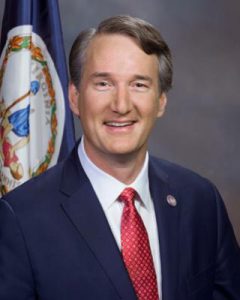 Current Position: Governor since 2022
Current Position: Governor since 2022
Affiliation: Republican
Glenn Youngkin is a homegrown Virginian who grew up in Richmond and Virginia Beach.
After earning an engineering degree at Rice University, and his MBA at Harvard Business School, Glenn and his wife Suzanne moved to Northern Virginia. Glenn landed a job at The Carlyle Group, where he spent the next 25 years. Working his way to the top of the company, Glenn played a key role in building Carlyle into one of the leading investment firms in the world. His efforts have helped fund the retirements of teachers, police officers, firefighters and other frontline public servants and supported hundreds of thousands of American jobs.
OnAir Post: Glenn Youngkin – VA
Lt. Governor Winsome Sears
 Current Position: Lt. Governor since 2022
Current Position: Lt. Governor since 2022
Affiliation: Republican
Candidate: 2022 Lt. Governor
Winsome was elected to a majority Black legislative district! No other Republican has done that in Virginia since 1865: She consequently also became the first (and still only) Black Republican woman elected to the House, the first female veteran, and the first legal immigrant woman.
Winsome is a mother, wife and is proud to have served in the United States Marines. She was also a hard-charging Vice President of the Virginia State Board of Education and received presidential appointments to the US Census Bureau (where she co-chaired the African American Committee) and the Advisory Committee on Women Veterans to the Secretary of Veterans Affairs.
In addition to her Masters degree, Winsome also built a successful business as a trained electrician and understands the importance of helping small businesses thrive. However, Winsome is most proud of her community work leading a men’s prison ministry and as director of a women’s homeless shelter for The Salvation Army.
For more information, go to this post.
Attorney General Jason Miyares
 Current Position: Attorney General for District 82 since 2022
Current Position: Attorney General for District 82 since 2022
Affiliation: Republican
Candidate: 2022 Attorney General
Former Position(s): State Delegate for 82nd from 2016 – 2021
In November of 2015, Jason Miyares won the open seat to the 82nd District for the House of Delegates by the widest margin in the district’s history while becoming the first Cuban-American ever elected to the Virginia General Assembly. Jason Miyares has brought commonsense conservative leadership and accountability to Richmond while fighting for fiscal discipline and government transparency.
In November of 2015, he won the open seat to the 82nd District for the House of Delegates by the widest margin in the district’s history while becoming the first Cuban-American ever electd to the Virginia General Assembly. Jason Miyares has brought commonsense conservative leadership and accountability to Richmond while fighting for fiscal discipline and government transparency.
US Representatives
Senator Mark Warner
 Current Position: US Senator since 2009
Current Position: US Senator since 2009
Affiliation: Democrat
Former Positions: Governor from 2002 – 2006; Venture Capital from 1989 – 2001
Other Positions:
Chair, Senate Intelligence Committee
Featured Quotes:
“Senator Warner is committed to strengthening our national security both at home and abroad, and he believes a strong and engaged United States is fundamental to securing our national interests around the world.”
When he left the Governorship in 2006, Virginia was ranked as the best state for business, the best managed state, and the best state in which to receive a public education.
OnAir Post: Mark Warner – VA
Senator Tim Kaine
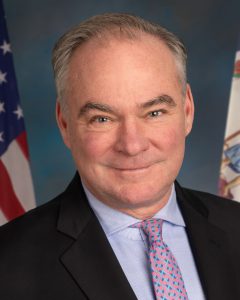 Current Position: US Senator since 2013
Current Position: US Senator since 2013
Affiliation: Democrat
Former Positions: Governor from 2006 – 2010; Lt. Governor from 2002 – 2006; Mayor from 1998 – 2001
Other Positions:
Chair, Subcommittee on Readiness and Management Support – Committee on Armed Services Budget Committee, Foreign Relations Committee, Health, Education, Labor, and Pensions Committee
Quotes:
“Tim has made boosting job opportunities for everyone a top priority. Tim is focused on crafting smart defense strategy and reducing the risk of unnecessary war. Tim believes that health care is a right … and has consistently pushed for reforms to expand access to quality care.”
OnAir Post: Tim Kaine – VA
Rob Wittman – VA01
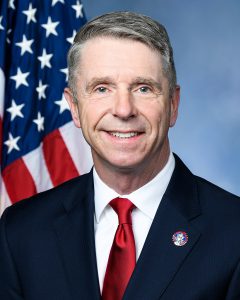 Current Position: US Representative since 2008
Current Position: US Representative since 2008
Affiliation: Republican
Former Positions: State Delegate from 2006 – 2008; Montross Town Council from 1996 – 2005
District: Includes the Historic Triangle of Jamestown, Williamsburg, and Yorktown
Mission: Rob is committed to getting things done. From rebuilding our Navy to increasing access to broadband, to making sure our children have a 21st-century education, he is constantly working for the First District.
OnAir Post: Rob Wittman – VA01
Jen Kiggans VA-02
Current Position: House Member District 2
Affiliation: Republican
District: includes Virginia Beach, the Eastern Shore, part of Chesapeake and Southampton, Isle of Wight, Suffolk, and Franklin City.
Kiggans is a former United States Navy helicopter pilot. She defeated incumbent Elaine Luria in the 2022 election. She came to Congress “determined to bring civility and competence to politics – something she believes is severely lacking in all levels of government – and provide Virginians with the strong, independent leadership in Washington they deserve.”
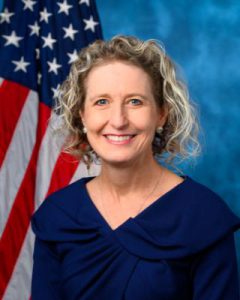 Current Position: House Member District 2
Current Position: House Member District 2
Affiliation: Republican
District: includes Virginia Beach, the Eastern Shore, part of Chesapeake and Southampton, Isle of Wight, Suffolk, and Franklin City.
Kiggans is a former United States Navy helicopter pilot. She defeated incumbent Elaine Luria in the 2022 election. She came to Congress “determined to bring civility and competence to politics – something she believes is severely lacking in all levels of government – and provide Virginians with the strong, independent leadership in Washington they deserve.”
Source: Government Page
OnAir Post: Jen Kiggans VA-02
OnAir Post: Jen Kiggans VA-02
Bobby Scott VA-03
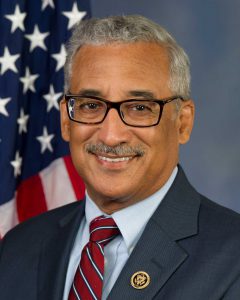 Current Position: US Representative of District 3 since 1993
Current Position: US Representative of District 3 since 1993
Affiliation: Democrat
Other Position: Ranking Member, Education and Labor Committee
District: Cities of Norfolk, Newport News, Hampton, Portsmouth, and part of the independent city of Chesapeake.
In the 118th Congress, Congressman Scott serves as the Ranking Member of the Committee on Education and the Workforce—his fifth term as the Committee’s Democratic leader. Congressman Scott also serves on the Committee on the Budget where he is a leading voice on fiscal policy. sponsored the Neighborhood Assistance Act, which provides tax credits to businesses for donations made to approved social service and crime prevention programs.
OnAir Post: Bobby Scott VA-03
Jennifer McClellan VA-04
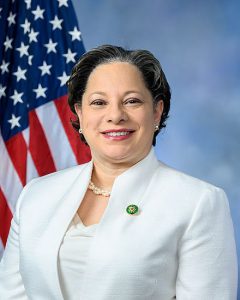 Current Position: US House of Representatives District 3 since 2023
Current Position: US House of Representatives District 3 since 2023
Affiliation: Democrat
Former Position: State Delegate from 2006 – 2017
District: All or part of the counties of Brunswick, Charles City, Chesterfield, Dinwiddie, Greensville, Henrico, Prince George, Southampton, Surry, and Sussex, and all or part of the independent cities of Colonial Heights, Emporia, Hopewell, Petersburg, and Richmond.
Jennifer Leigh McClellan is an attorney who has represented the 9th district in the Virginia State Senate from 2017 to 2023 and the 71st district in the Virginia House of Delegates from 2009 to 2017. She ran in the Democratic primary for governor of Virginia in the 2021 election, losing to former governor Terry McAuliffe.
McClellan was the Democratic nominee in the 2023 Virginia’s 4th congressional district special election, and defeated Republican nominee Leon Benjamin with 74.4% of the vote. She is the first Black woman elected to Congress from Virginia.
OnAir Post: Jennifer McClellan VA-04
John McGuire VA-05
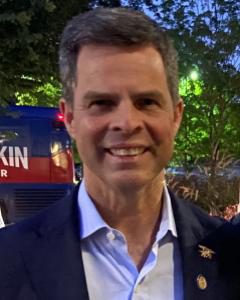 John Joseph McGuire III (born August 24, 1968) is an American politician and businessman who is a member of the Virginia State Senate.
John Joseph McGuire III (born August 24, 1968) is an American politician and businessman who is a member of the Virginia State Senate.
McGuire was elected to the Virginia House of Delegates in 2017, and represented the old 56th district which comprised areas to the North and West of Richmond, Virginia. He was then elected to the newly redrawn 10th Senate district in 2023.
McGuire was a candidate for the United States House of Representatives in Virginia’s 5th congressional district in the 2024 election, having previously defeated the incumbent Bob Good in the Republican primary. The final vote tally saw McGuire beating Good by 374 votes, with election results being certified on July 2. McGuire’s win was upheld in a recount requested by Good.McGuire, on November 5, won against his Democratic opponent Gloria Witt, becoming Member-elect of the U.S. House of Representatives. He will assume office on January 3, 2025, succeeding current Representative Bob Good.
Ben Cline VA-06
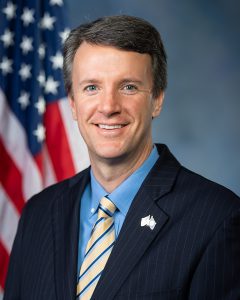 Current Position: US Representative of US House District 6 since 2019
Current Position: US Representative of US House District 6 since 2019
Affiliation: Republican
Former Position: State Delegate from 2002 – 2017
District: Including Roanoke and most of the Shenandoah Valley
Ben Cline previously served as a Member of the Virginia House of Delegates, representing the 24th District from 2002-2018. In the Virginia House, Cline chaired the Committee on Militia, Police, and Public Safety.
Prior to his election to the House of Representatives in 2018, Ben was an attorney in private practice. From 2007 until 2013, he served as an Assistant Commonwealth’s Attorney for Rockingham County and the City of Harrisonburg.
Ben also worked for Congressman Bob Goodlatte, beginning as a member of his legislative staff in 1994 and ultimately serving as the Congressman’s Chief of Staff.
OnAir Post: Ben Cline VA-06
Eugene Vindman VA-07
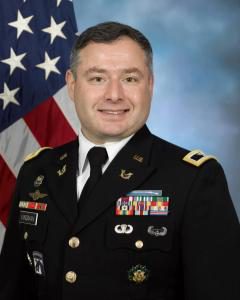 Eugene Semyon Vindman (born June 6, 1975) is an American politician, attorney, and retired U.S. Army officer. He was a deputy legal advisor for the United States National Security Council (NSC) until he was reassigned on February 7, 2020. A member of the Democratic Party, Vindman is the U.S. member-elect for Virginia’s 7th congressional district.
Eugene Semyon Vindman (born June 6, 1975) is an American politician, attorney, and retired U.S. Army officer. He was a deputy legal advisor for the United States National Security Council (NSC) until he was reassigned on February 7, 2020. A member of the Democratic Party, Vindman is the U.S. member-elect for Virginia’s 7th congressional district.
Vindman came to national attention in October 2019 when his twin brother, Lieutenant Colonel Alexander Vindman, testified before the United States Congress regarding the Trump–Ukraine scandal. Eugene received the report of President Trump’s telephone call that provoked the scandal from Alexander and reported the call to senior White House lawyers. Alexander’s testimony provided evidence that resulted in a charge of abuse of power in the first impeachment of Donald Trump.
Don Beyer VA-08
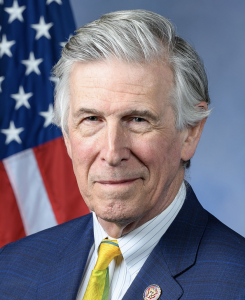 Current Position: US Representative of US House District 8 since 2015
Current Position: US Representative of US House District 8 since 2015
Other Positions: Joint Economic Committee; Ranking Chair of the Subcommittee on Space; Member of the Subcommittees on Trade, Select Revenue Measures (Ways & means), and Research and Technology
Affiliation: Democrat
Former Position: Lt. Governor from 1990 – 1998; Business owner
District: Including all of Alexandria, Arlington, and Falls Church, as well as parts of Fairfax County.
Pinned Tweet: I am grateful to voters in Northern Virginia for again making me their Democratic nominee to represent Virginia’s 8th District. Their trust in me is humbling, and I will continue to do all I can to earn it.”
OnAir Post: Don Beyer VA-08
Morgan Griffith VA-09
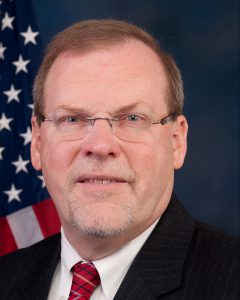 Current Position: US Representative since 2011
Current Position: US Representative since 2011
Affiliation: Republican
Candidate: 2023 US Senator; Lawyer
Former Position: State Delegate from 1993 – 2010
District: Covering much of the southwestern part of the state.
Howard Morgan Griffithis an American lawyer. His district covers a large swath of southwestern Virginia, including the New River Valley and the Virginia side of the Tri-Cities. He is a member of the Republican Party and the Freedom Caucus.
Griffith was the majority leader of the Virginia House of Delegates and represented the 8th district from 1994 to 2011. The district was based in his hometown of Salem and included parts of surrounding Roanoke County
Suhas Subramanyam VA-10
 Suhas Subramanyam (born September 26, 1986) is an American lawyer and former member of the Virginia Senate, representing the 32nd district. He is the Congressman-elect for Virginia’s 10th congressional district. Suhas lives in Ashburn, Virginia with his wife Miranda and daughters. An attorney, he served on the Loudoun Health Council and volunteered as an EMT/firefighter.
Suhas Subramanyam (born September 26, 1986) is an American lawyer and former member of the Virginia Senate, representing the 32nd district. He is the Congressman-elect for Virginia’s 10th congressional district. Suhas lives in Ashburn, Virginia with his wife Miranda and daughters. An attorney, he served on the Loudoun Health Council and volunteered as an EMT/firefighter.
He previously served in the Virginia House of Delegates, representing the 87th district. A Democrat, he was elected in 2019 and became the first Indian-American, South Asian, and Hindu to ever be elected to the Virginia General Assembly. He previously served as a White House advisor to President Barack Obama.
Gerry Connolly VA-11
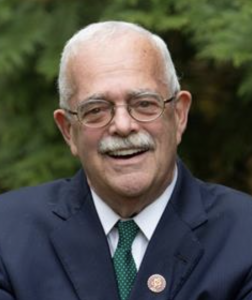 Current Position: US Representative of US House District 11 since 2009
Current Position: US Representative of US House District 11 since 2009
Affiliation: Democrat
Former Position: Board of Supervisors – Fairfax County from 1995 – 2007
District: Comprises most of Fairfax County and the entirety of Fairfax City.
Pinned Tweet 2/24/22: Sorry, you lose the right to complain about partisanship once you’ve fanned the flames of violent insurrection.
Learn About Gerry Connolly in one minute
OnAir Post: Gerry Connolly VA-11
More Information
Democracy promoting Nonprofits
League of Women Voters of Virginia – Making Democracy Work
Mission
The nonprofit Virginia Public Access Project elevates public understanding of politics and government by organizing and presenting information in ways that are easily accessible and free of partisan bias.
VPAP is fiercely nonpartisan. We do not lobby or take positions on issues. Our singular focus is to give Virginians information they need to make their own decisions.
We were founded in 1997 with one simple premise: If Virginia’s campaign finance system relies upon disclosure, citizens should have the right to know who is giving to whom. Since then, we have expanded our focus to include related topics such as election results, lobbying, the legislative process and redistricting.
Our approach is grounded in verifiable facts drawn directly from government databases. Our integrated methods provide unique and valuable insights into decisions that impact your family and community. Our data visualizations turn complex data into easily digestible information.
In addition, we operate a free news aggregation service. VaNews provides a convenient way to find articles about government and politics that meet high standards for original news reporting.
VPAP’s unique, nonpartisan approach is supported by Republicans and Democrats alike. Our work has won awards from numerous organizations, including the Virginia Coalition for Open Government, the Wilder School of Public Policy at VCU and the Society of Professional Journalists.
Free news sources
VPM PBS
As Virginia’s home for public media, VPM connects nearly 2 million people across Central Virginia and the Shenandoah Valley to insightful programming in arts and culture, history, science, news and education.
In addition to acclaimed series and documentaries, VPM produces compelling original content across platforms for local audiences and national distribution.
From its Richmond-area newsroom, VPM News delivers award-winning coverage of statewide politics, local government, education and legal issues, as well as the news of the day from NPR. VPM Music is home to a 24/7 blend of classical, jazz and world music serving the Richmond region.
A critical partner for parents, caregivers and teachers of the Commonwealth’s children, VPM offers free access to PBS KIDS content, bespoke educational content through the Science Matters initiative, plus local events and outreach.
VPM operates public television stations VPM PBS, VPM Plus, VPM PBS KIDS, lifestyle channel VPM Create and international program channel VPM WORLD, as well as Richmond public radio stations VPM News (88.9 FM) and VPM Music (107.3 FM, 93.1 FM and 88.9-HD2). In the Northern Neck (89.1 FM) and Southside Virginia (90.1 FM), listeners receive a combination of news and music stations. Audiences can access VPM online at VPM.org, and on Facebook, Twitter, Instagram and YouTube.
Our Mission
To use the power of media to educate, entertain, and inspire.
Our Vision
More connected, informed and empathetic Virginians.
Virginia Mercury
Nonprofit. Nonpartisan. No paywalls. Fair and tough reporting on the policy and politics that affect all of us is more important than ever. The Mercury brings you coverage of the commonwealth’s biggest issues from a team of veteran Virginia journalists.
Wikipedia
Contents
The government of Virginia combines the executive, legislative and judicial branches of authority in the Commonwealth of Virginia. The current governor of Virginia is Glenn Youngkin. The State Capitol building in Richmond was designed by Thomas Jefferson, and the cornerstone was laid by Governor Patrick Henry in 1785. Virginia currently functions under the 1971 Constitution of Virginia. It is Virginia’s seventh constitution. Under the Constitution, the government is composed of three branches: the legislative, the executive and the judicial.
Executive branch
The statewide elected officials are governor, lieutenant governor, and attorney general.
All three officers are separately elected four-year terms in years following presidential elections (1997, 2001, 2005, etc.) and take office in January of the following year. Virginia is one of only five states that elects its state officials in odd numbered years (the others are Kentucky, Louisiana, Mississippi, and New Jersey). The last gubernatorial election was in 2021, and the next will occur in 2025.
The governor serves as chief executive officer of Virginia and as commander-in-chief of its militia. The Constitution does not allow a governor to succeed himself in office (though a governor is allowed to serve multiple non-consecutive terms). The lieutenant governor, who is not elected on the same ticket as the governor, serves as president of the Senate of Virginia and is first in the line of succession to the governor. The lieutenant governor is allowed to run for reelection. The attorney general is chief legal advisor to the governor and the General Assembly, chief lawyer of Virginia, and the head of the Department of Law. The attorney general is second in the line of succession to the governor. Whenever there is a vacancy in all three executive offices of governor, lieutenant governor, and attorney general, then the speaker of the Virginia House of Delegates becomes governor.
Glenn Youngkin, a Republican, is the Governor. The Lieutenant Governor is Winsome Sears, a Republican, and is Virginia’s first black female Lt. Governor, and Virginia’s attorney general, Jason Miyares, is a Republican and the first Latino elected to statewide office.
Cabinet
The Virginia Governor’s Cabinet is a body of the most senior appointed officers of the executive branch, responsible for advising the governor. It is composed of the following offices,[1] nominated by the governor and then presented to the Virginia General Assembly for confirmation:

- Chief of Staff
- Deputy Chief of Staff
- Secretary of the Commonwealth
- Secretary of Administration
- Secretary of Agriculture and Forestry
- Secretary of Commerce and Trade
- Secretary of Education
- Secretary of Finance
- Secretary of Health and Human Resources
- Secretary of Natural Resources
- Secretary of Public Safety
- Secretary of Transportation
- Secretary of Veterans Affairs and Homeland Security
Many executive branch agencies have the authority to promulgate regulations. Proposals to create or amend state regulations are often subject to review by the executive branch.
Legislative branch

The legislative branch or state legislature is the General Assembly. The General Assembly is a bicameral body consisting of a lower house, the Virginia House of Delegates, with 100 members, and an upper house, the Senate of Virginia, with 40 members. Combined, the General Assembly consists of 140 elected representatives from an equal number of constituent districts across Virginia. The General Assembly holds sessions in the Virginia State Capitol in Richmond.
The House of Delegates is presided over by the speaker of the House, while the Senate is presided over by the lieutenant governor of Virginia. The House and Senate each elect a clerk and sergeant-at-arms. The Senate of Virginia‘s clerk is known as the clerk of the Senate (instead of as the secretary of the Senate, the title used in the United States Senate). The General Assembly also selects the Virginia’s auditor of public accounts. The statutory law enacted by the General Assembly is codified in the Code of Virginia.
Judiciary

The judiciary of Virginia is defined under the Constitution and law of Virginia and is composed of the Supreme Court of Virginia and subordinate courts, including the Court of Appeals, the Circuit Courts, and the General District Courts. Its administration is headed by the chief justice of the Supreme Court, the Judicial Council, the Committee on District Courts, the Judicial Conferences, and various other officers.
Local government
The political subdivisions of Virginia are the areas into which the state is divided for political and administrative purposes. In Virginia, the political subdivisions have only the legal powers specifically granted to them by the General Assembly and set forth under the Code of Virginia.
Some are local governments; others are not. However, all local governments (cities, counties, and incorporated towns) are political subdivisions of the state. All public school divisions are political subdivisions of the state, although each has local and some controlling relationships of varying types with the counties, cities and/or towns they serve. Some political subdivisions are defined geographically; others by function. Many authorities (such as water, or transportation districts) are created by specific legislation as political subdivisions of the state.
Structure and authority

Every location in Virginia is within a county or an independent city, but never both. The 95 counties and the 39 independent cities all have their own governments. Cities are governed by an elected mayor or city council which choose a city manager or county administrator to serve as a professional, non-political chief administrator under the council-manager form of government, while counties are governed by a county board of supervisors.[2] Many specifics are set forth in “charters”, specific legislation adopted by the General Assembly. Other forms of local government are also provided by statute.[3]
Virginia limits the authority of cities and counties to enact ordinances by what is known as the Dillon’s Rule. Counties and cities may only pass laws expressly allowed by the state legislature or which are necessary to effect powers granted by the state.[4] Dillon’s Rule will invalidate local ordinances that exceed authority granted by the state.[5]
There are exceptions to the general structure for counties and cities, notably the City of Richmond, which has a popularly elected mayor who serves as chief executive separate from the city council, an innovative arrangement which has caused some local turmoil under the first mayor so elected, former Governor Douglas Wilder. As of November 2007, the courts were in the process of clarifying the duties and powers, and limitations thereupon in response to multiple lawsuits filed by other locally elected officials.[6]
Officers

Local government consists of city and county officers, as well as people who are known as constitutional officers. The positions of these constitutional officers are provided for by the Virginia Constitution. Article 7, Section 4 of the Virginia constitution provides, “There shall be elected by the qualified voters of each county and city a treasurer, a sheriff, an attorney for the Commonwealth, a clerk, who shall be clerk of the court in the office of which deeds are recorded, and a commissioner of revenue.” The local constitutional offices are not appointed by the city or county. The judges of the Circuit Court, the General District Court and the Juvenile and Domestic Relations District Court are appointed by the state legislature. The constitutional officers have salaries set by the state through its compensation board,[7] although the locality may supplement the salaries.[8] This structure allows those officers a measure of independence within the local government setting.
Virginia’s attorney is the elected prosecuting attorney for the locality.[9] The sheriff is the law enforcement officer for localities without a police department. Where a police department has been established, the sheriff remains authorized to enforce the criminal laws.[10] The sheriff, however, is responsible for the operation of the local jail, courthouse security and service of civil papers and may also execute criminal warrants.[11]
History
Founded in 1619, the Virginia General Assembly is still in existence as the oldest legislature in the New World. In colonial Virginia, the lower house of the legislature was called the House of Burgesses. Together with the Governor’s Council, the House of Burgesses made up the “General Assembly”. The Governor’s Council was composed of 12 men appointed by the British monarch to advise the governor. The council also served as the “General Court” of the colony, a colonial equivalent of a Supreme Court. Members of the House of Burgesses were chosen by all those who could vote in the colony. Each county chose two people or burgesses to represent it, while the College of William and Mary and the cities of Norfolk, Williamsburg and Jamestown each chose one burgess. The Burgesses met to make laws for the colony and set the direction for its future growth; the council would then review the laws and either approve or disapprove them. The approval of the Burgesses, the council, and the governor was needed to pass a law. The idea of electing burgesses was important and new. It gave Virginians a chance to control their own government for the first time. At first, the burgesses were elected by all free men in the colony. Women, indentured servants, and Native Americans could not vote. Later the rules for voting changed, making it necessary for men to own at least fifty acres (200,000 m2) of land in order to vote.
Like many other states, by the 1850s Virginia featured a state legislature, several executive officers, and an independent judiciary. By the time of the Constitution of 1901, which lasted longer than any other state constitution, the General Assembly continued as the legislature, the Supreme Court of Appeals acted as the judiciary, and the eight executive officers were elected: the governor, lieutenant governor, attorney general, secretary of the commonwealth, state treasurer, auditor of public accounts, superintendent of public instruction, and commissioner of agriculture and immigration. The Constitution of 1901 was amended many times, notably in the 1930s and 1950s, before it was abandoned in favor of more modern government, with fewer elected officials, reformed local governments and a more streamlined judiciary.
See also
- Politics of Virginia
- Elections in Virginia
- Republican Party of Virginia
- Democratic Party of Virginia
- Law of Virginia
References
- ^ “Governor’s Cabinet”. Office of the Governor of Virginia. Archived from the original on April 13, 2014. Retrieved April 11, 2014.
- ^ Code of Virginia § 15.2-102
- ^ Code of Virginia § 15.2-301
- ^ “Dillon’s Rule stipulates that municipal corporations have only those powers expressly granted by statute, those necessarily implied therefrom, and those that are essential and indispensable to the exercise of those expressly granted. In Virginia, a corollary rule provides that boards of supervisors of counties are similarly limited to those powers conferred expressly or by necessary implication by statute. Our cases refer to these principles collectively as the Dillon Rule”.
Advanced Towing Co. v. Fairfax County Board, 280 Va. 187, 193, 694 S.E.2d 621, ___ (2010) - ^ “Thus, ‘[w]hen a local ordinance exceeds the scope of this authority, the ordinance is invalid.’ City of Chesapeake, 253 Va. at 246, 482 S.E.2d at 814; see also Board of Supervisors v. Reed’s Landing Corp., 250 Va. 397, 400, 463 S.E.2d 668, 670 (1995)….” Schefer v. City Council of Falls Church, 279 Va. 588, 593, 691 S.E.2d 778, ___ (2010)
- ^ Judge will rule on Wilder’s power – politics – inRich.com Archived August 23, 2007, at archive.today
- ^ Code of Virginia § 15.2-1636.16
- ^ Code of Virginia § 15.2-1605.1
- ^ Code of Virginia § 15.2-1627
- ^ Code of Virginia § 19.2-81
- ^ Code of Virginia § 15.2-1609
External links
